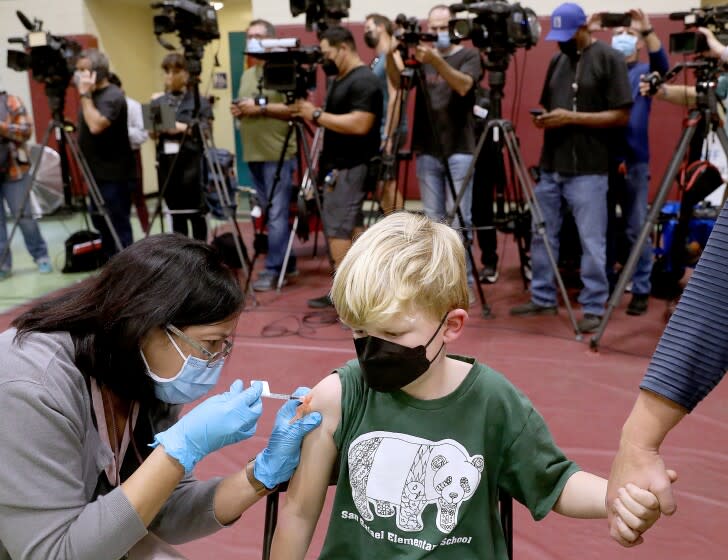Editorial: Get more kids vaccinated against COVID, yes, but two bills need more work

Despite the number of "breakthrough" infections with the Omicron variant, California kids and their schools would be safer if more students were vaccinated against COVID-19. Two new bills aim to accomplish that — one would mandate vaccination to attend school and the other would allow kids 12 and older to be vaccinated without parental consent.
While both bills have attractive features, both also raise legal and ethical questions in trying to reach the goal of a close-to-fully-vaccinated population of young people.
In general, our society favors allowing parents to make medical decisions for children. But when public health (or a child’s life) is threatened, the balance changes. Individual rights go only so far, ending at the point where they endanger the safety of others.
The Omicron variant is highly contagious and higher vaccination rates would mean less spread of this very transmissible version of the coronavirus. Schools are scrambling to stay on top of the situation — which means a lot of students staying home because they were exposed at school. A vaccine mandate would make a serious difference to students’ health and education. That's why parents should be signing their kids up for the jab.
A bill by state Sen. Richard Pan (D-Sacramento) would add COVID-19 to the list of nine diseases for which almost all California students must be vaccinated. As a practical measure, Senate Bill 871 is on the right track and much stronger than the vaccine mandate imposed by Gov. Gavin Newsom, which, when it takes effect after final U.S. Food and Drug Administration approval of the vaccines, would allow personal-belief exemptions. That’s pretty much the same as not having a mandate at all.
But SB 871 would not wait for final FDA approval before the mandate would take effect in January 2023. Right now, the Pfizer-BioNTech vaccine is available to those ages 5 to 15 only under emergency use authorization. The argument for mandating COVID-19 vaccines to attend public or private school is valid: The state already requires vaccinations for a long list of diseases. But all of those vaccines have received final FDA approval.
While the evidence points to the Pfizer shot being safe and effective for children 5 and older, final approval requires another level of review, and the FDA can quickly withdraw that authorization for treatments approved under emergency authorization if it finds that they are not as safe and/or effective as the data originally indicated. That happened this week with two monoclonal antibody treatments for COVID-19 that proved ineffective against Omicron.
Without clear evidence that current vaccination rates among students (about 64% of 12- to-17-year-olds and only 22% of 5- to 11-year-olds are vaccinated) are resulting in significant numbers of hospitalizations or deaths, it goes too far to require a vaccine that has not been fully approved. It is also not clear that the bill could pass legal muster; federal law allows people the right to refuse vaccines with only emergency authorization. Final approval will probably come before the bill would take effect, anyway. The bill could do without this troubling provision.
SB 871 would also empower the state Department of Public Health to add other diseases to the list of mandatory inoculations, as needed. That makes sense; in an urgent situation such as COVID-19, the state shouldn’t need new legislation for every disease that comes along. And if threatening new variants emerge, vaccination against those might become possible and necessary. But it’s unclear whether the agency would have the power to take a disease off the list once vaccination no longer appears necessary — or to make existing vaccines mandatory, such as flu shots. The bill’s language is in its early stages, and later iterations should clarify what could otherwise become a thorny situation.
Another bill that aims for higher vaccination rates among young people is Senate Bill 866, introduced by state Sen. Scott Wiener (D-San Francisco), which would allow anyone 12 or older to be vaccinated against any disease without parental permission.
The state allows that age group to obtain birth control, abortions and vaccination and treatment for sexually transmitted diseases without a parent’s consent, but that’s because kids are often afraid to tell parents about their sexual activity and because of the possibility of abuse.
Once people reach the age of understanding that they might be endangered by their parents’ resistance to vaccination — whether it’s against COVID-19 or chickenpox — they should have some say over their own health. The harder question is getting agreement on the appropriate age of understanding in this case. But no minor should be allowed to decide unilaterally to get a vaccine that has not received final FDA approval.
The goal is the right one: Increase vaccination of children. But both of these bills need more time on the drawing board to strike the right balance.
This story originally appeared in Los Angeles Times.

